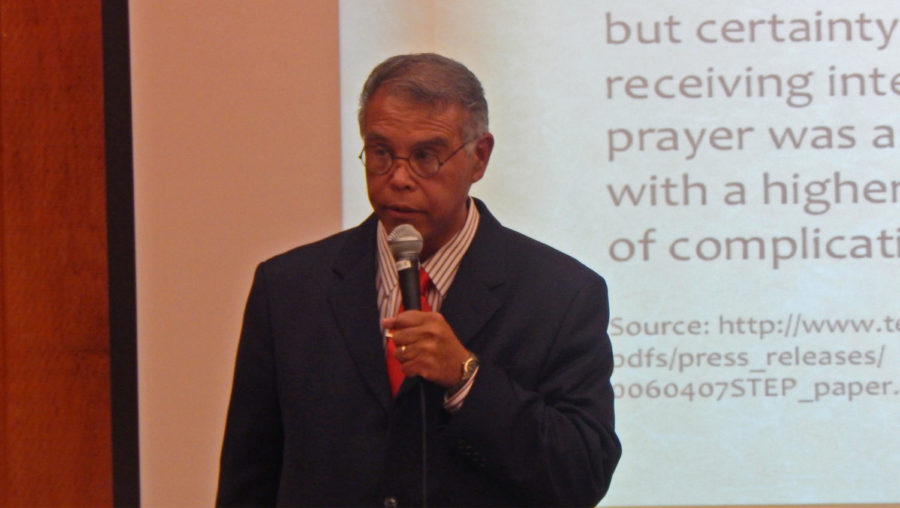ISU Professor Hector Avalos to Lecture on Jesus’s Flaws
Dalton Gackle/Iowa State Daily
Professor in Religious Studies Hector Avalos, professor of philosophy and religious studies, presents his research that science cannot prove that prayer works.
March 7, 2018
Regardless of religious or political persuasion, it’s almost universally agreed upon that Jesus Christ was a paradigm of human morality. Nearly everyone thinks of the Christian messiah as a champion of love and kindness.
Then there’s Hector Avalos.
In his book “The Bad Jesus,” Avalos argues that one could use the New Testament scripture to argue even Jesus had his flaws. On March 8, he’ll even bring that argument to 0305 Carver Hall in a lecture titled “What’s so bad about Jesus?”
“Take a look at Luke 14:26,” Avalos said. “Jesus says that you have to hate your mother, hate your father and your whole family in order to follow him.”
To Avalos, this command is immoral. He explained that many Christians and Christian Bible Scholars interpret the verse in some peculiar ways.
“This is as clear an expression of hate as ever,” Avalos said. “People try to defend it by saying it just means you must love Jesus more than your family, or that you must separate yourself from your family, but it defies the linguistics of the phrase.”
Avalos studied the Bible at Harvard University, where he earned his doctorate. He is an expert in the Ancient Near East and began teaching at Iowa State in 1993. He wrote several other books about the Bible, including “The End of Biblical Studies” and “Slavery, Abolitionism and the Ethics of Biblical Scholarship.”
What surprised Avalos the most, and ultimately drove him to write “The Bad Jesus,” was the lack of knowledge within the Biblical scholar community about pre-Christian writings.
“Jesus was not the first person to say ‘love your enemies,’” Avalos explained. “Some of these scholars are so narrowly trained they don’t read the pre-Christian literature from Egypt or Mesopotamia.”
Despite the polarizing title, “The Bad Jesus” has seen good reviews since being published in 2015.
“There’s been a surprisingly good response from Christian scholars,” Avalos said. He’s been asked to give the same lecture at a Unitarian church in Washington D.C. on March 16, and the Ames Collegiate Methodist Church invited him to speak later this April.
Avalos says that people shouldn’t have to depend on supposedly perfect entities to act morally.
“You shouldn’t appeal to someone 2000 years old to do the right thing,” Avalos said. “You should do the right thing because it’s the right thing to do.”







